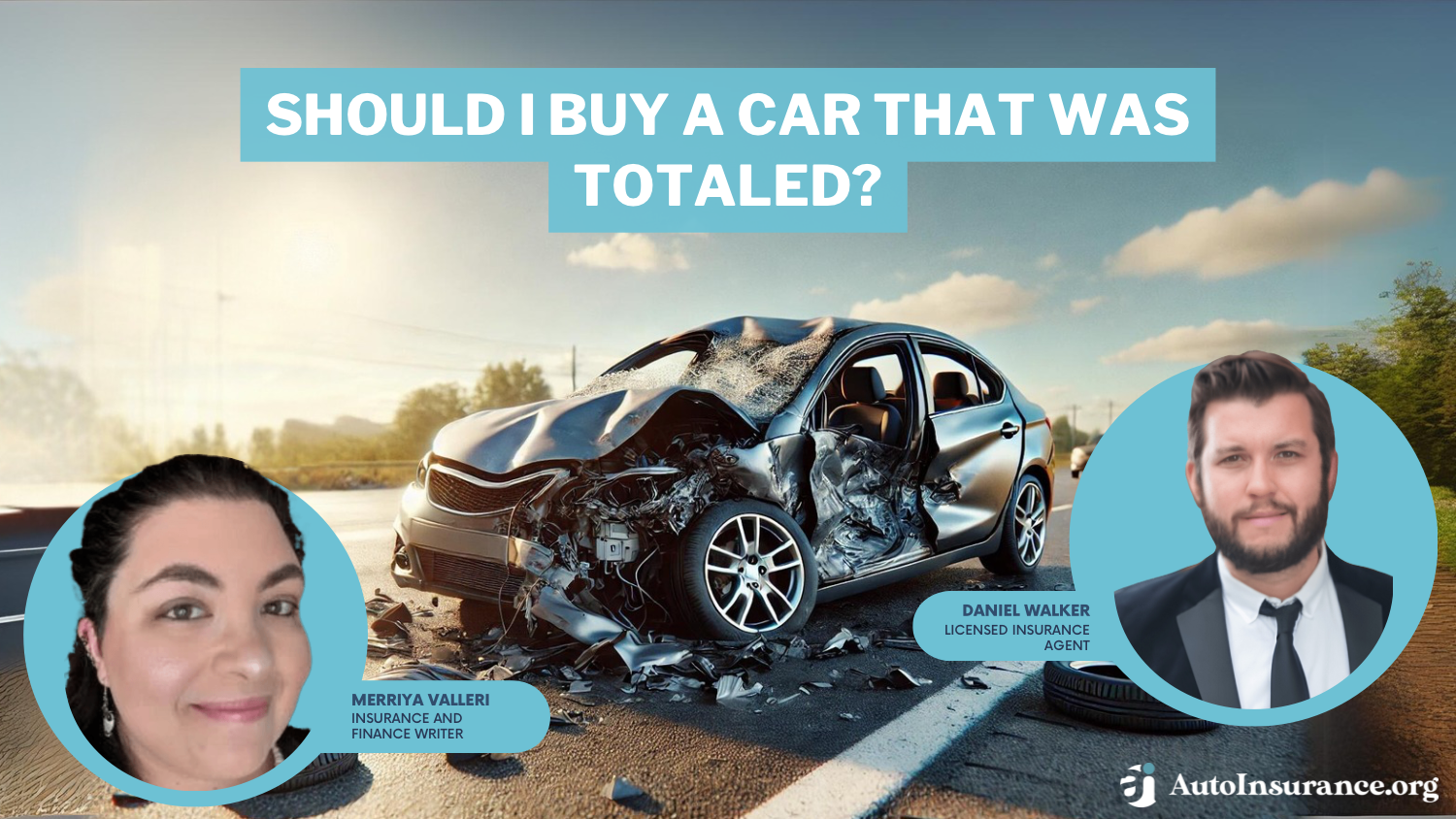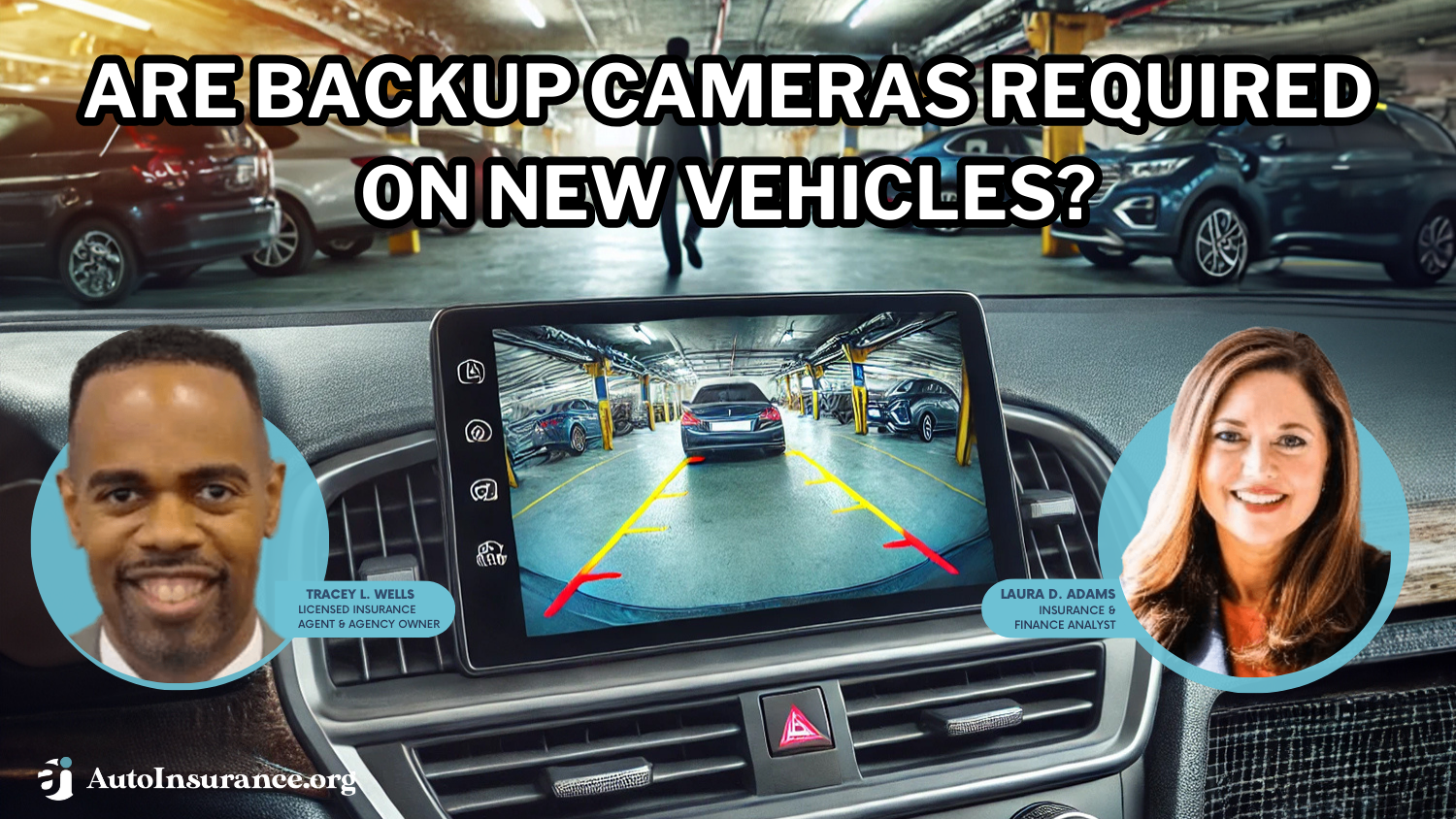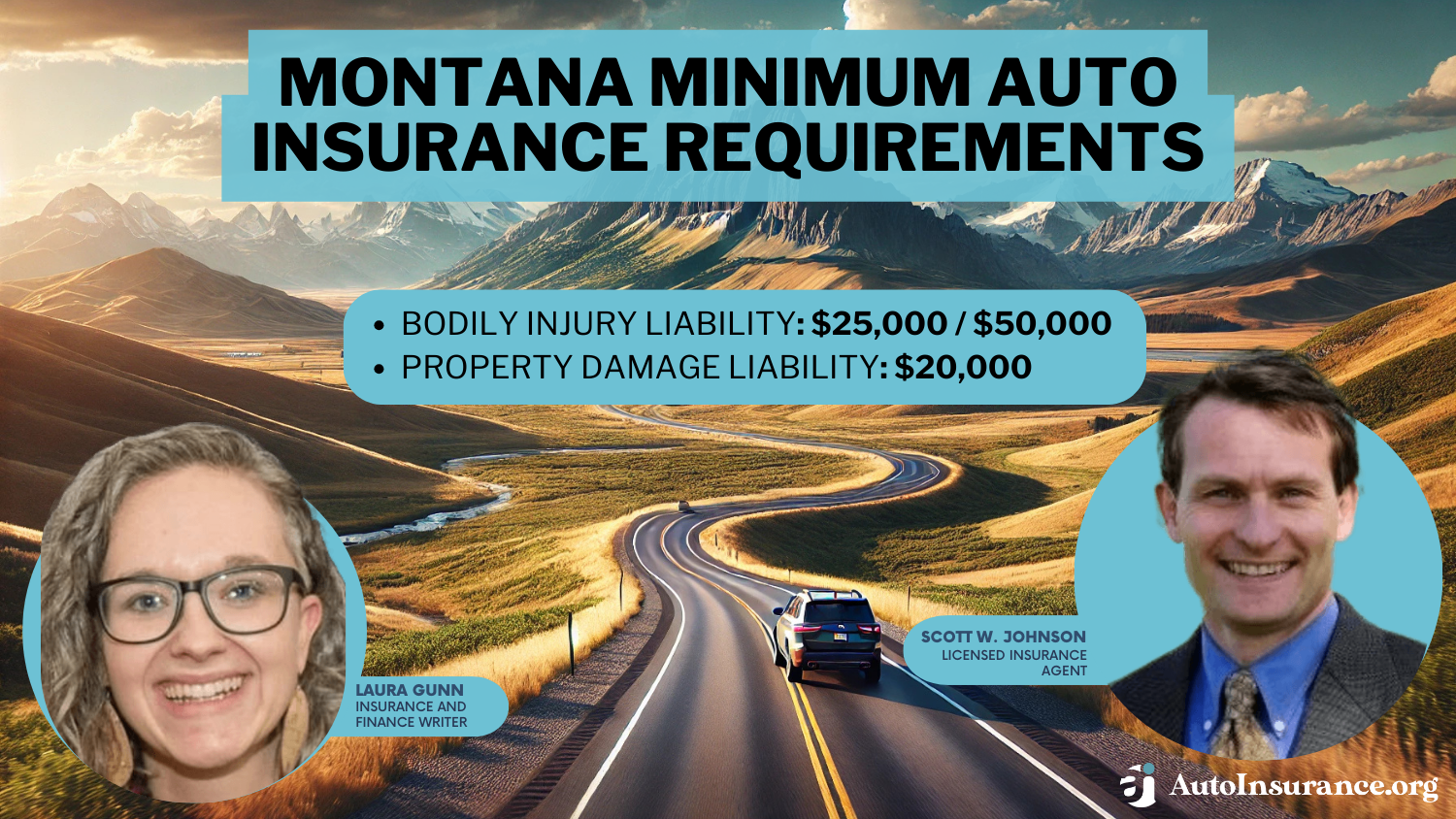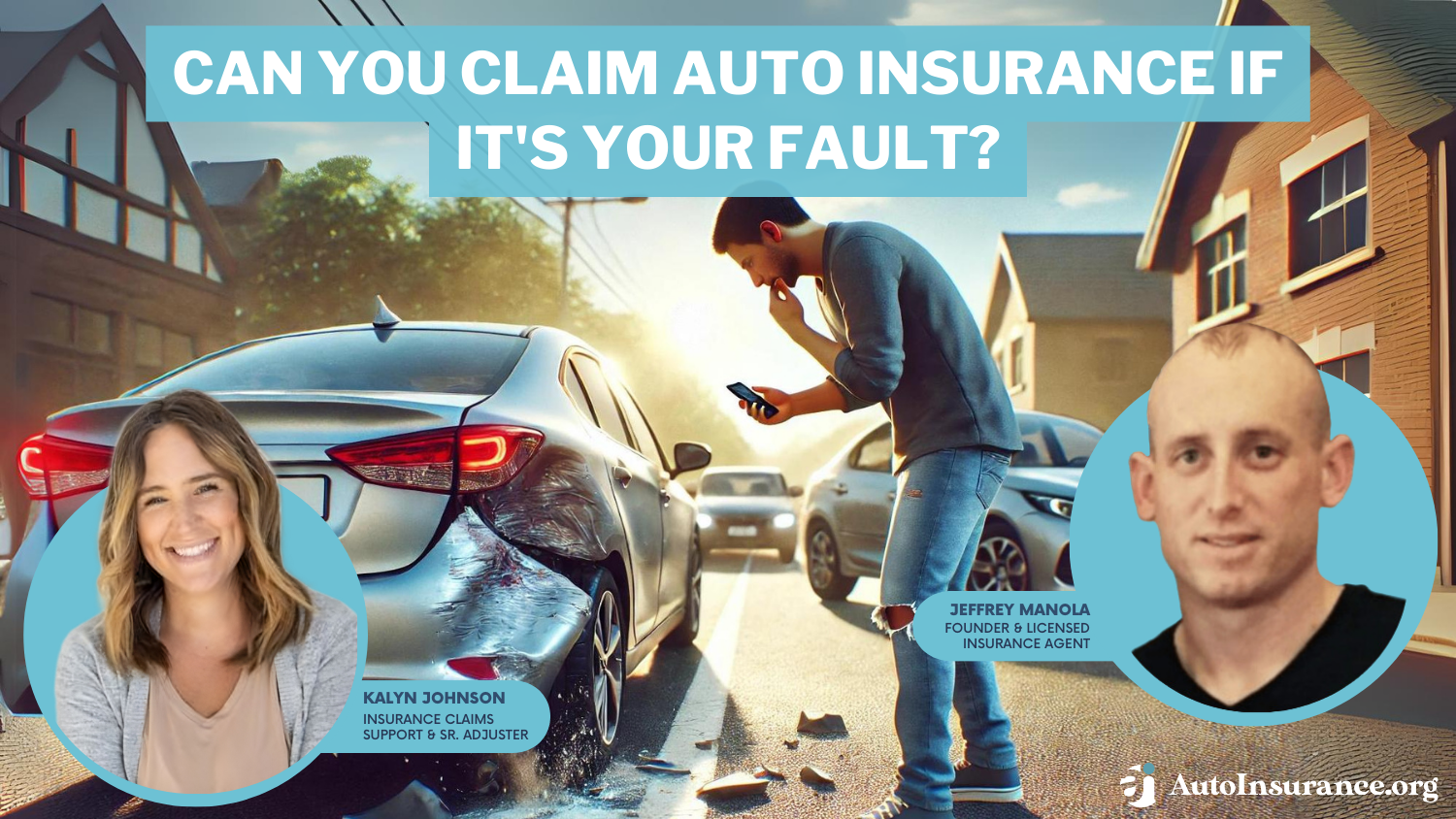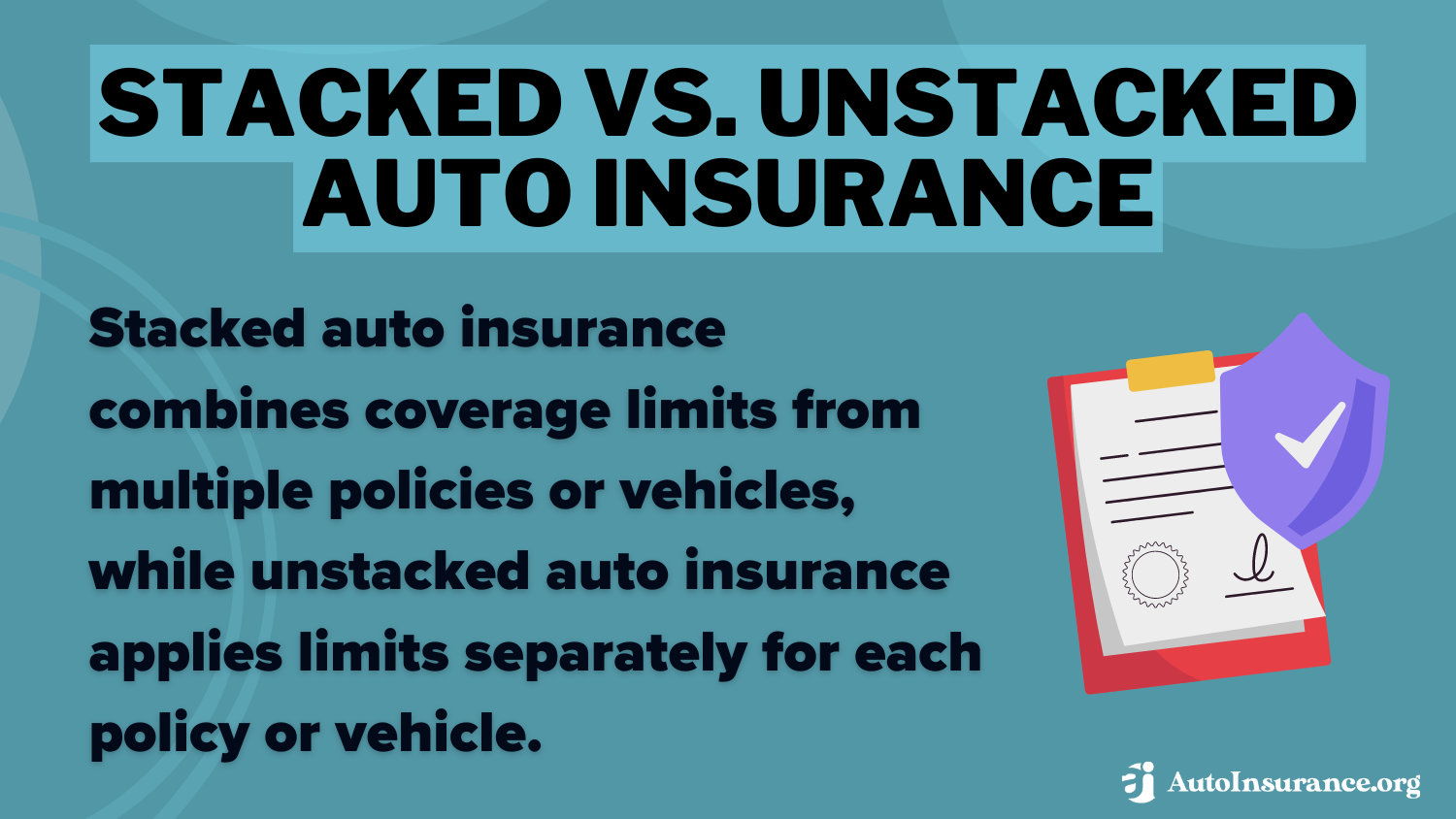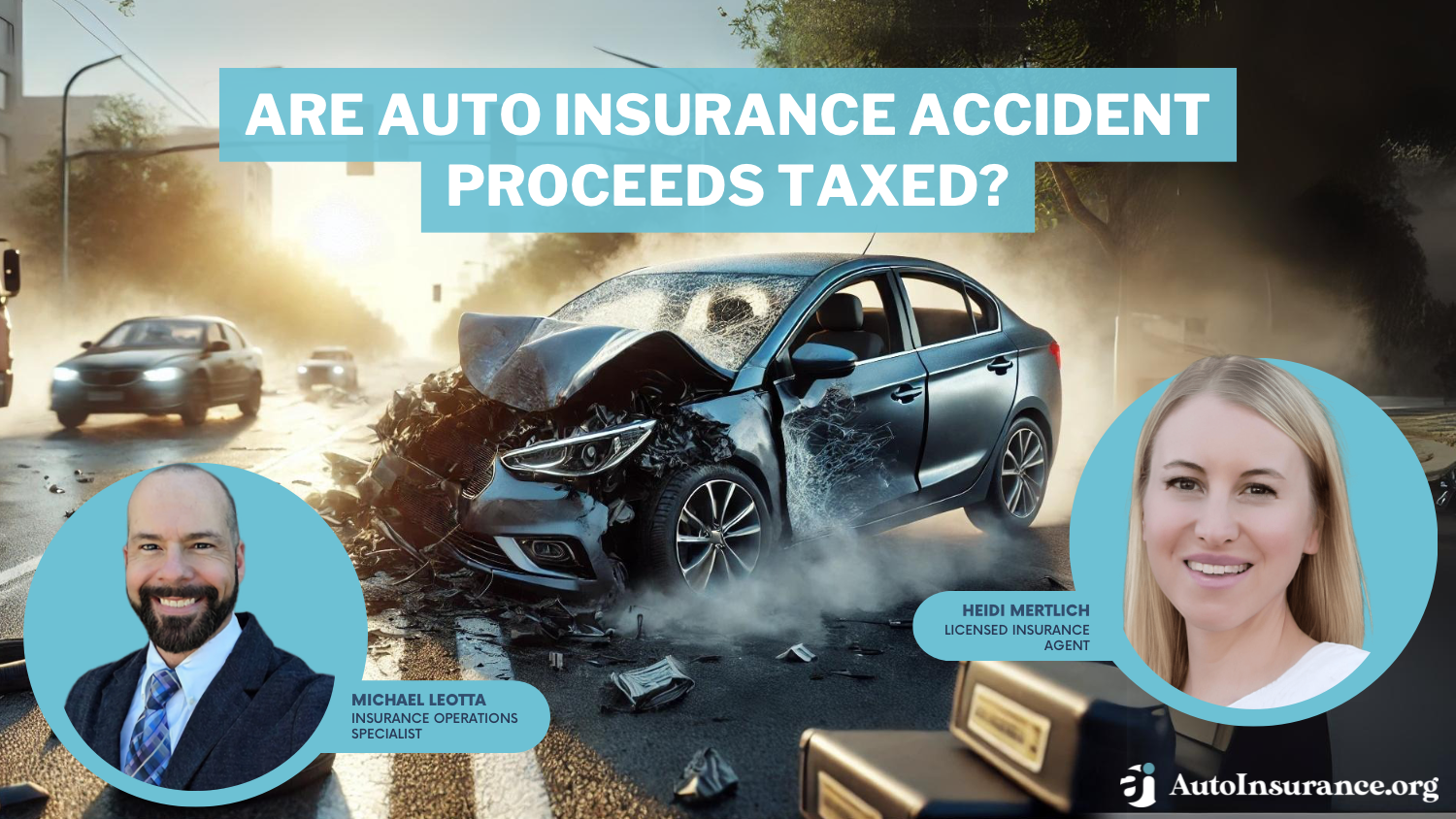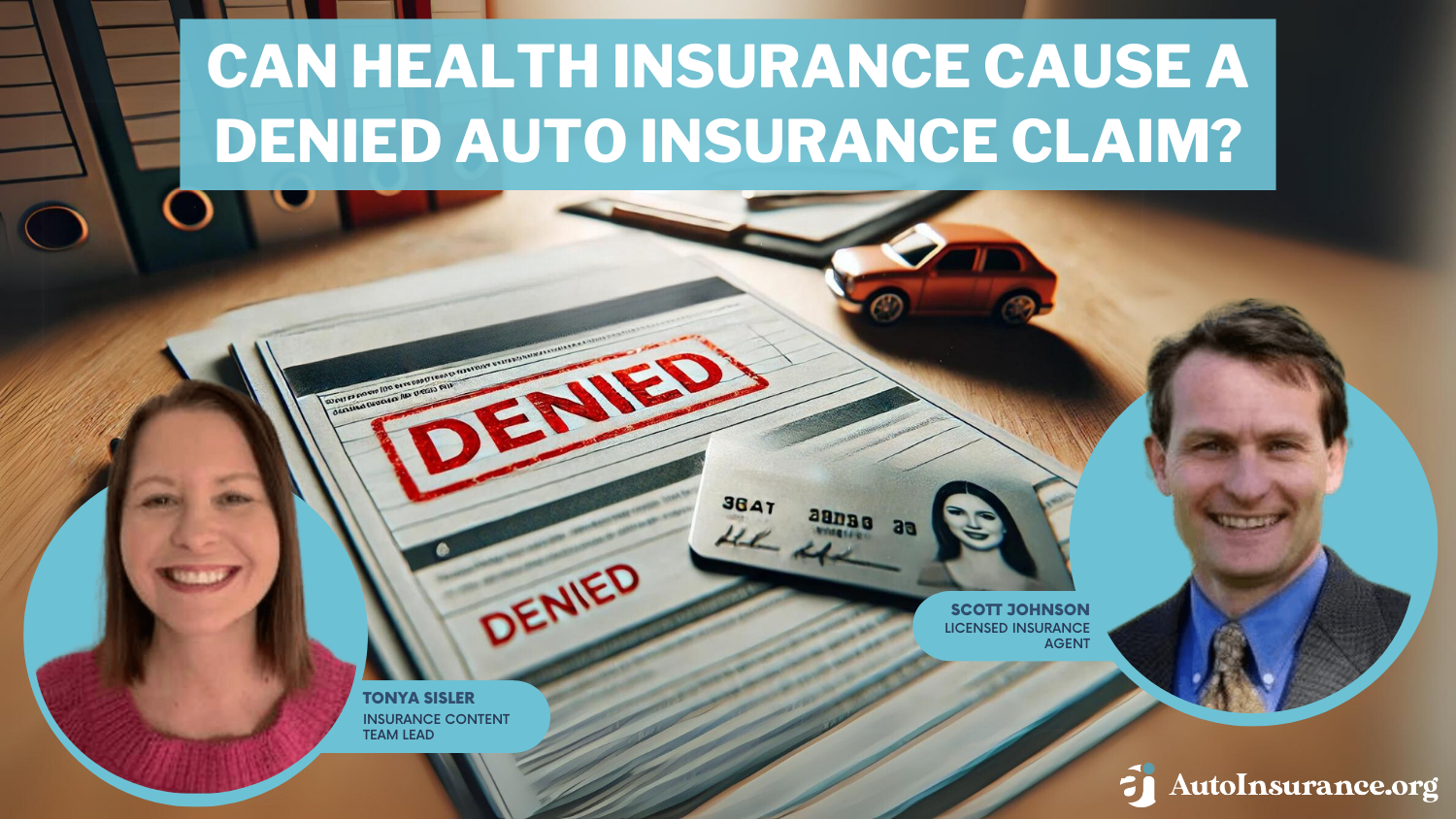Should I buy a car that was totaled?
Sometimes cars declared a total loss by an insurance company are available for purchase. Here’s what you need to know if you’re considering buying a totaled car.
Secured with SHA-256 Encryption




Table of Contents
Table of Contents


Insurance and Finance Writer
Merriya Valleri is a skilled insurance writer with over a decade of professional writing experience. Merriya has a strong desire to make understanding insurance an easy task while providing readers with accurate and up-to-date information. Merriya has written articles focusing on health, life, and auto insurance. She enjoys working in the insurance field, and is constantly learning in order to ...
Merriya Valleri


Licensed Auto Insurance Agent
Daniel Walker graduated with a BS in Administrative Management in 2005 and has run his family’s insurance agency, FCI Agency, for over 15 years (BBB A+). He is licensed as an insurance agent to write property and casualty insurance, including home, life, auto, umbrella, and dwelling fire insurance. He’s also been featured on sites like Reviews.com and Safeco. To ensure our content is accura...
Daniel Walker
Updated December 2024
When you’re looking to buy a new car or truck, stumbling upon a vehicle with great mileage and a nice exterior priced under market value can feel like a lucky break. But could there be a catch?
If you’re considering buying a car that was totaled, there is often a lot more to consider than the selling price. From finding an insurer that will cover a salvage title vehicle to financing challenges and safety concerns related to the vehicle’s history, buying a once-totaled vehicle can be tedious — and risky — for car buyers. In some cases, it can even be a wasted investment.
Read on to learn more about what a totaled car is, how buying a salvage title vehicle differs from purchasing a new or used car or truck, and why it’s important to weigh the pros and cons before investing in a car that was totaled.
- A car is considered totaled when the cost of repairing it after an accident exceeds the vehicle’s actual market value
- Vehicles with a salvage history can be challenging to finance and insure and can end up costing more than they’re worth
- Because cars that were totaled have a history of extensive damage, it’s important to ensure any vehicle with a salvage history is safe to drive before buying it
What Does it Mean When a Car is Totaled
A car is considered “totaled” when its repair costs after an accident exceed the vehicle’s actual cash value (ACV) according to the insurer’s criteria and state law.
When a vehicle is declared a total loss, the insurer will typically reimburse the owner for the car’s value rather than covering the higher cost of repairs. After a vehicle is determined to be totaled, it is usually assigned what is known as a salvage title.
Also, when a car is declared totaled, it means the cost of repairs exceeds a certain percentage of the car’s value, making it uneconomical to fix. This designation often leads to the vehicle being sold at a significantly reduced price, presenting an opportunity for some buyers. For instance, one can buy a totaled car from an insurance company at a fraction of its pre-accident value.
However, it’s crucial to assess the extent of the damage and the feasibility of repairs. Similarly, buying back a totaled car from insurance can be an option for previous owners who have sentimental value attached to their vehicles or believe they can manage the repairs themselves.
The availability of totaled cars for sale provides a variety of choices, including different makes and models, making it easier for buyers to find a suitable vehicle that meets their needs.
On the other hand, the decision to purchase a totaled vehicle comes with several risks. Many potential buyers wonder, is it bad to buy a total loss vehicle? The answer depends on multiple factors, such as the extent of the damage and the buyer’s willingness to invest in repairs.
For those looking for larger vehicles, totaled truck for sale options might be appealing due to their typically higher value and robustness. However, thorough inspections and cost assessments are vital before making a purchase.
Additionally, buying a car from an insurance company requires understanding the insurance company’s valuation and repair criteria. While there are benefits to acquiring a vehicle at a reduced cost, buyers must weigh these against potential hidden damages and future repair expenses.
Free Insurance Comparison
Compare Quotes From Top Companies and Save
Secured with SHA-256 Encryption
How Does Insurance Value Your Car
If you total your car, does insurance pay for it? Although your insurance company won’t pay to repair a totaled vehicle, they will typically offer to reimburse you for the actual cash value of your vehicle.
However, determining how insurance companies value totaled cars is more complicated. Car values often vary between insurers, but the process for valuing a vehicle remains relatively consistent across providers.
For example, when a claims adjuster assesses the damage to your vehicle after an accident, they take into account the car’s mileage, age, and history of previous accidents and damage before consulting the Kelley Blue Book to determine its value. Check out our Totaled Car Value Calculator for more information.
What is the “book value” of a vehicle?
“Book value” refers to a vehicle’s market value. The term comes from book listings, like Kelley Blue Book, which closely tracks the automotive market and the amount that every make and model currently sells for. The actual cash value of a vehicle at any given time is its “book value.”
Furthermore, when an insurance company values your car after an accident, they determine the car total loss value based on factors such as the car’s age, mileage, and condition prior to the accident. This value is what the insurance company will pay you if the car is deemed a total loss.
In specific locations like Georgia, the total loss car value in Georgia may also consider regional market trends and the availability of similar vehicles. Understanding the date of loss in car insurance is crucial, as it marks the point at which the car’s value is assessed and can affect the settlement you receive.
For individuals considering buying a car that has been in an accident, knowing how the car’s value was calculated can provide insight into whether the purchase price reflects the vehicle’s true worth.
For those facing the challenge of financing a car after a total loss, it can be a complex process, especially if dealing with buying a new car after a total loss with bad credit. Lenders may view these buyers as higher risk, potentially leading to higher interest rates or the need for a larger down payment.
Nevertheless, buying a totaled car can be an affordable option if you’re prepared to handle repairs and understand the car’s diminished value. Informed buyers can make strategic decisions by researching the insurance valuation process and considering how previous accidents impact the car’s current and future value.
Salvage Title vs. Revived Salvage Title
Although totaled vehicles that are later restored to roadworthiness are often referred to as “salvage vehicles,” you should be aware of the important differences between salvage titles and restored or revived titles:
- Salvage title. Refers to a vehicle that is currently considered by an insurer or vehicle owner to be unsuitable and likely unsafe to drive. Salvage title vehicles cannot legally be driven or insured.
- Revived salvage title. Refers to a vehicle that has been totaled but restored to good condition. When a vehicle has been assigned a revived or restored salvage title, it has been determined safe to drive on roads and highways.
Unlike salvage vehicles, revived salvage titles can also be legally insured. However, insurance coverage for vehicles with a salvage history is often limited, even when restored.
Furthermore, when considering the differences between salvage title vs. total loss, it’s essential to understand that a salvage title is given to a vehicle that has been declared a total loss by an insurance company. This means the cost of repairs exceeds a certain percentage of the vehicle’s value.
A vehicle declared a total loss by an insurance company receives a salvage title, indicating it has sustained significant damage. Many people wonder, is it ok to buy total loss vehicle? The answer depends on various factors, such as the extent of the damage, the cost of repairs, and the buyer’s willingness to invest time and money into the restoration process.
Buying a total loss vehicle can be economical if you have the resources and knowledge to repair it properly.
On the insurance side, it’s important to be aware of terms like insurance loss reported, insurance loss history, and insurance loss record. These terms refer to the documented history of a vehicle’s past damages and claims.
When looking for insurance total loss cars available for sale, these records can provide valuable information about the extent of damage and previous repairs. Understanding the history of a vehicle with a salvage title can help you make an informed decision about whether it’s a worthwhile investment.
By researching a car’s background, including any insurance loss history, you can better evaluate the risks and potential benefits of purchasing a vehicle that has been through a significant accident.
Pros and Cons of Buying a Total Loss Vehicle
Due to the disadvantages associated with a history of extensive damage, buying a vehicle that has been totaled isn’t advisable for most drivers. However, purchasing a vehicle with a salvage history can benefit some people under certain circumstances.
Some of the advantages of buying a vehicle that has been totaled include the following:
- Lower purchasing price. Totaled vehicles are often sold for less than the market value of identical makes and models without a salvage history because of the extensive damage they sustained.
- A source of spare parts. Mechanics, car enthusiasts, and drivers who own multiple cars could benefit from having a vehicle on hand for spare parts or scrap metal.
- A fun project. Restoring a totaled vehicle to good condition can be a fun project for mechanically-inclined people.
- Discovering a “diamond in the rough.” Although it’s less common, finding vehicles with a salvage history that aren’t in terrible shape once repaired is a possibility. For example, a recovered stolen vehicle might have never been involved in an accident before being declared a total loss. Additionally, an older vehicle might have been declared a total loss after sustaining cosmetic damage due to the difference between its low ACV and the cost of repairs.
The disadvantages of buying a car that has been totaled include the following:
- Safety issues. Revived salvage titles can still have safety issues despite being deemed roadworthy. It’s often difficult to know the extent of the damages that led to the car being declared a total loss after the fact, and the quality of repair work is often difficult to assess. Buyers should be especially cautious about vehicles that have been damaged in floods since water damage can take months or years to become fully apparent.
- Financing challenges. Banks and credit lenders often view vehicles with a salvage history as high-risk, making them more difficult to get a loan.
- Limited insurance coverage. Insurance companies are generally hesitant to offer full coverage to vehicles with a salvage history. Coverage options for cars that have been totaled are often limited to liability-only policies.
- Difficult to sell. Cars that have been totaled are sometimes difficult to resell due to their history and associated challenges.
- The potential for fraud. Dishonest sellers can easily take advantage of the opportunity to sell a used vehicle with a restored salvage title as-is. And because information about past damage can be difficult to confirm, buyers often have no legal recourse when suing sellers without evidence that they were deliberately misled.
Despite the benefits, vehicles with a salvage history come with serious risks that every car buyer should be aware of before making a purchase.
Furthermore, when considering a total loss car in Florida, it’s important to weigh the pros and cons of buying a car that has been in an accident. One of the main advantages is the reduced purchase price, which can be significantly lower than a similar vehicle with a clean title.
However, the disadvantages of a salvage title include potential difficulties in obtaining insurance and financing, as well as concerns about the vehicle’s safety and reliability. For those who are knowledgeable about car repairs, a total loss car purchase can be an economical choice, but it’s essential to thoroughly inspect the vehicle and understand the extent of the damage.
Some buyers may also consider keeping a totaled car or opting to buy back car after total loss from their insurance company. This can be a viable option if the repair costs are manageable and the buyer has a sentimental attachment to the vehicle. However, the pros and cons of buying a salvage title car should be carefully evaluated.
While the lower price is appealing, the potential for hidden damages and the stigma attached to a salvage title can be significant drawbacks. Making an informed decision involves understanding the vehicle’s history, repair costs, and long-term implications of owning a salvage title car.
Free Insurance Comparison
Compare Quotes From Top Companies and Save
Secured with SHA-256 Encryption
Buying a Vehicle That was Totaled
If you’ve weighed the advantages and disadvantages and decided that you still want to buy a car that was totaled, ensure your new investment is safe with the following tips:
- Obtain a vehicle history report. Use a service like Carfax or AutoCheck to pull the vehicle’s history using its vehicle identification number (VIN). Look out for red flags like a car being towed from the scene of an accident or air bags being deployed.
- Run the VIN through national databases. Although there are no guarantees when buying a vehicle with a revived salvage title, using databases like the National Motor Vehicle Title Information System can help avoid fraudulent titles.
- Ask a mechanic to perform a full vehicle inspection. Instead of relying on the seller’s word about the vehicle’s condition, have a trusted mechanic perform a full inspection of the vehicle to check for any serious issues, including frame damage.
- Ask the seller for detailed records and information. Ask the seller detailed questions about the vehicle’s past damage. Review photos of the damage before repairs and ask for the vehicle’s repair records. You can also contact the body shop that repaired the vehicle and speak with the mechanic who worked on it.
- Examine the title. Determine how long ago the revived salvage title was issued. The repairs might have been sufficient if the revived title had been assigned years ago and the car had been driven regularly. However, repairs associated with a recently-issued revived title might be more difficult to assess. Either way, consult a qualified mechanic before making a decision.
- Take the vehicle for a test drive. Take the car out for a spin to ensure it drives well and that you’re comfortable with its current condition. Test every button and knob to ensure they work, assess the alignment, and check the brakes.
- Know your local laws. Inspection requirements and regulations about damage to totaled vehicles vary from state to state. Take time to understand local laws and title requirements before buying a vehicle with a salvage history.
- Talk to an insurance agent. Auto insurance for salvage vehicles is often limited. Insurers aren’t willing to insure vehicles with a salvage history. Contact an insurance agent to ensure the vehicle is insurable before buying it.
- Be prepared to be the vehicle’s last owner. Due to challenges with financing and insuring a car that has been totaled, selling a vehicle with a salvage history isn’t easy. If you buy a revived salvage title vehicle, understand that you might be stuck with it.
- How to Finance a Car That Was Totaled. It can be challenging to find a loan to buy a car that was totaled because banks and lenders often view vehicles with a salvage history as high-risk.
Although getting approved for an auto loan depends on a number of factors, qualified buyers with good credit and a history of on-time payments might consider applying for an unsecured personal loan to help pay for their vehicle. Loan features can vary by lender, so make sure to compare interest rates and other requirements before applying.
In addition, buying a total loss car can be an economical option for savvy buyers who are prepared to invest in repairs. Total loss car buyers often look for deals on a totaled car for sale because these vehicles are sold at significantly lower prices compared to their market value.
Buying a totaled car from an insurance company can provide further savings, as insurance companies are eager to offload these vehicles quickly. However, it is crucial to thoroughly inspect the car and understand the extent of the damage before making a purchase. This ensures that the buyer is aware of potential repair costs and any future issues that might arise from buying a totaled car.
How to Insure a Vehicle with a Salvage History
Insurance companies are generally hesitant to fully insure vehicles with a salvage history due to the possibility of extensive damage and safety issues. Because of that, insurance for vehicles that have been totaled is often limited to liability auto insurance coverage. In some situations, insurance companies might refuse to insure a vehicle with a salvage history.
Before buying a total loss vehicle, consider getting a pre-purchase insurance quote to find out how much you can expect to pay for insurance — and whether the vehicle you’re considering buying is insurable.
It’s also important to remember that insurance rates are sometimes higher for vehicles with a salvage history due to their history, so the quotes you receive could exceed the average rate for insurance coverage in your state.
Full Coverage Auto Insurance Monthly Rates by State
State Rates
Alabama $105
Alaska $103
Arizona $112
Arkansas $116
California $140
Colorado $115
Connecticut $123
Delaware $156
Florida $142
Georgia $132
Hawaii $83
Idaho $77
Illinois $92
Indiana $92
Iowa $86
Kansas $111
Kentucky $145
Louisiana $173
Maine $80
Maryland $129
Massachusetts $101
Michigan $238
Minnesota $124
Mississippi $105
Missouri $102
Montana $107
Nebraska $104
Nevada $114
New Hampshire $86
New Jersey $138
New Mexico $105
New York $138
North Carolina $86
North Dakota $124
Ohio $82
Oklahoma $118
Oregon $102
Pennsylvania $112
Rhode Island $143
South Carolina $117
South Dakota $109
Tennessee $102
Texas $133
Utah $96
Vermont $93
Virginia $81
Washington $80
Washington D.C. $129
West Virginia $116
Wisconsin $94
Wyoming $104
Because rates and policy options vary, shop around and compare quotes to ensure you get the best rates and insurance coverage available.
Furthermore, buying a car after a total loss involves several important steps, particularly when it comes to insuring the vehicle. If you are buying a total loss vehicle with a clean title, the insurance process can be more straightforward, as a clean title is generally easier to insure compared to a salvage title.
However, finding such a vehicle can be challenging. When buying a new car after a total loss, it is crucial to understand the insurance implications and ensure that the new vehicle meets all necessary safety and inspection standards.
For those wondering, How to buy a total loss vehicle?, the process typically involves purchasing from insurance auctions or salvage yards, followed by extensive repairs and inspections to ensure the vehicle is roadworthy and insurable.
Buying a New Car After a Total Loss
After totaling your vehicle, you have options to make buying a new car easier, including asking your insurer for a higher payout.
For example, after your vehicle has been declared a total loss and you’ve received an offer from the claims adjuster, you can try to negotiate a higher payout if the insurer’s estimated value seems too low. This can help you obtain more money to put down on a new car or truck after your vehicle is totaled.
Learn how to set up insurance for a new car after yours is declared a total loss.
Buying a Vehicle That was Totaled: The Lowdown
Buying a vehicle that has been totaled is a risky move that isn’t recommended for most car buyers. Although purchasing a car or truck with a salvage history can have benefits under certain conditions, the advantages don’t outweigh the risks in most cases.
Even if the car has been restored, it’s important to fully understand the risks and responsibilities associated with buying a vehicle that has been declared a total loss before making a purchase.
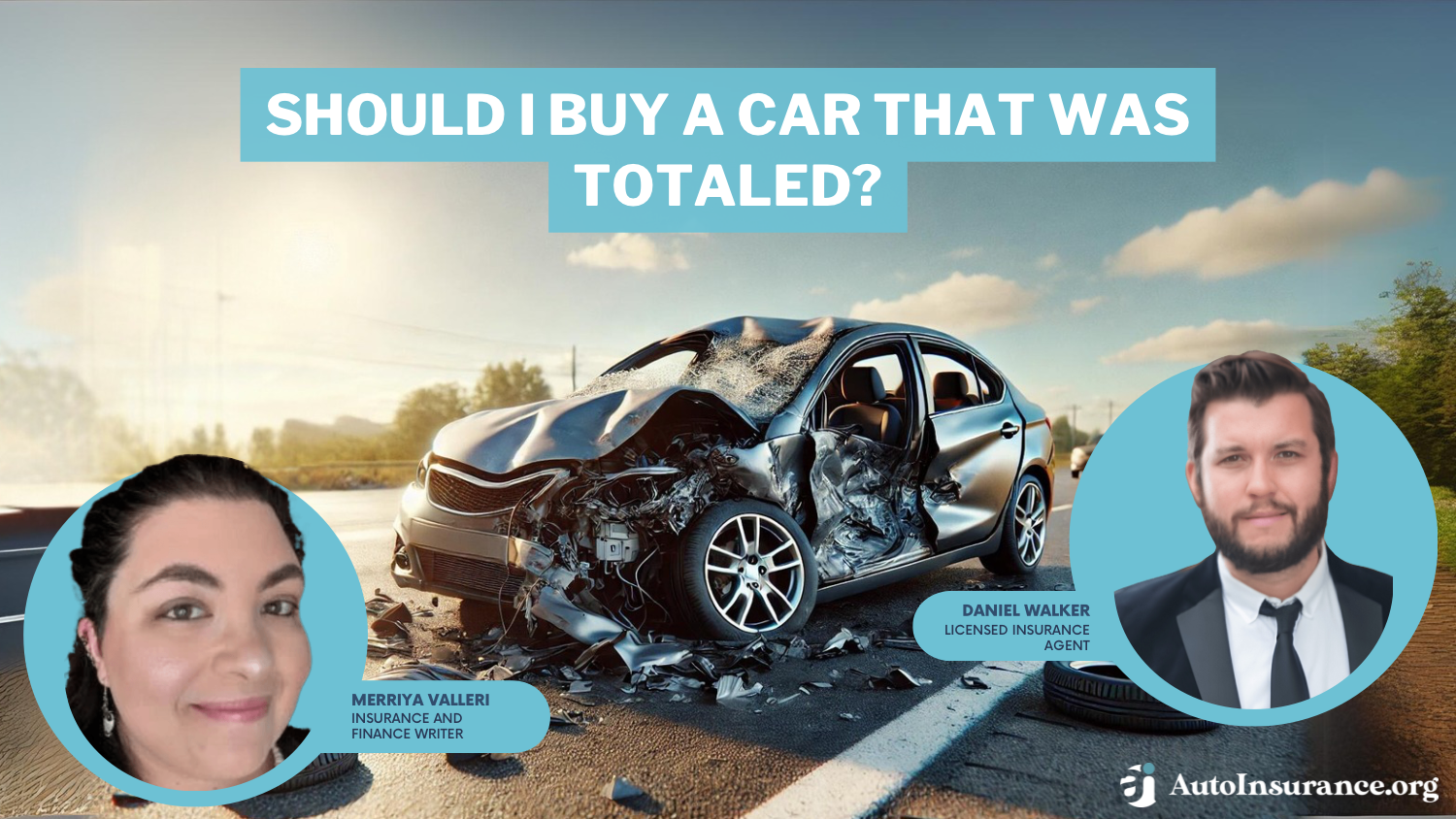
Frequently Asked Questions
What is a salvage title?
Vehicles are assigned a salvage title when an insurance company declares them a “total loss” — when a vehicle is damaged in an accident, and the cost of repairs exceeds the vehicle’s actual cash value. Car buyers should approach salvage title vehicles with caution due to their history of extensive damage.
What are the disadvantages of buying a salvage car?
If you’re considering buying a car that was totaled, be prepared to invest a lot of time and energy into fulfilling the requirements of owning the vehicle. You should also expect to spend a fair amount of money on maintenance and possible repairs.
It’s also important to remember that your investment might not pay off if you’re unable to insure the vehicle or sell it to anyone but a scrapyard.
Who should buy a car that was totaled?
Although salvage title vehicles aren’t recommended for car buyers who plan to drive regularly, someone looking for a second car might consider buying a totaled car, so long as they aren’t looking to drive it often. Mechanics or auto enthusiasts looking for a vehicle to restore as a project or hobby might also consider buying a totaled car.
How does insurance value your car?
If your car is totaled, the insurance company will typically offer to reimburse you for the actual cash value of your vehicle. The process for valuing totaled cars involves considering factors such as mileage, age, history of previous accidents, and consulting resources like the Kelley Blue Book.
How can I ensure the safety of a totaled car I want to buy?
If you decide to buy a totaled car, there are several steps you can take to ensure its safety. These include obtaining a vehicle history report, getting a thorough inspection by a trusted mechanic, and researching any recalls or safety issues related to the specific make and model.
Should I buy a total loss vehicle?
Buying a total loss vehicle can be economical, as these cars are often sold at significantly lower prices. However, it comes with risks such as potential hidden damages, difficulty obtaining insurance, and lower resale value. It’s crucial to thoroughly inspect the car, understand the extent of the damage, and be prepared for potential repair costs before making a purchase.
Should I buy a car with an insurance loss reported?
A car with an insurance loss reported has sustained significant damage in the past, usually from an accident. This history can affect the car’s value and insurability. If you consider buying such a car, ensure it has been properly repaired and that you can obtain detailed information about the nature and extent of the damage.
Is buying a total loss car worth it?
Whether buying a total loss car is worth it depends on factors like the severity of the damage, the cost of repairs, and your ability to manage those repairs. It can be a good deal if you get the car at a low price and can restore it safely. However, you must consider potential long-term issues and the difficulty in obtaining comprehensive insurance coverage.
What does ‘insurance loss reported’ mean?
‘Insurance loss reported’ means that the vehicle has been involved in a significant incident that resulted in an insurance claim for damages. This report typically indicates that the car has been in an accident or has sustained substantial damage that required a major insurance payout for repairs.
How do insurance companies calculate a total loss?
Insurance companies calculate a total loss by comparing the cost of repairs to the car’s actual cash value (ACV) before the accident. If the repair costs exceed a certain percentage (usually 70-80%) of the ACV, the car is declared a total loss. They consider factors like the car’s age, mileage, condition, and market value to determine the ACV.
How does Uber know if your car is salvage?
How much does insurance pay for a total loss car?
How soon can I get a new car after a total loss?
How to buy a totaled car from an insurance company?
If my car is a total loss, can I buy it back?
Is it bad to buy a car with an accident history?
Is it better to have a car totaled or repaired?
Is it worth buying a car with a salvage title?
What are the disadvantages of having a salvage title?
What does total loss claim mean on a title?
What does insurance loss reported mean on Carfax?
Get a FREE Quote in Minutes
Insurance rates change constantly — we help you stay ahead by making it easy to compare top options and save.

